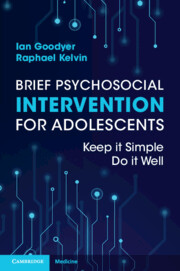Book contents
- Brief Psychosocial Intervention for Adolescents
- Brief Psychosocial Intervention for Adolescents
- Copyright page
- Contents
- Acknowledgements
- 1 Adolescence and the Psychotherapies
- 2 Evidence-Based Psychotherapy
- 3 Evolving the BPI Method
- 4 The Evidence Base for BPI
- 5 Practice Framework and Clinical Principles
- 6 Clinical Styles and Therapy Tools
- 7 BPI in Clinical Practice: Part One
- 8 BPI in Clinical Practice: Part Two
- 9 Top Tips for Best Practice
- Index
- References
3 - Evolving the BPI Method
Published online by Cambridge University Press: 16 March 2023
- Brief Psychosocial Intervention for Adolescents
- Brief Psychosocial Intervention for Adolescents
- Copyright page
- Contents
- Acknowledgements
- 1 Adolescence and the Psychotherapies
- 2 Evidence-Based Psychotherapy
- 3 Evolving the BPI Method
- 4 The Evidence Base for BPI
- 5 Practice Framework and Clinical Principles
- 6 Clinical Styles and Therapy Tools
- 7 BPI in Clinical Practice: Part One
- 8 BPI in Clinical Practice: Part Two
- 9 Top Tips for Best Practice
- Index
- References
Summary
In Chapter 1 we described the emergence of the concept of adolescence in the early twentieth century and how it represented a new and developmentally sensitive period of ongoing mental maturation. We also noted that the talking cures were fast gaining a foothold in developed societies and adolescents were beginning to be a focus of these interventions, this being due to the clear-cut increases in mental health difficulties and emergent mental illnesses in the second decade of life. The theories and techniques of the psychotherapies were, until the 1970s, relatively uninfluenced by the emergence of the concept of adolescence and its implications for mind-brain maturation. This implies that very little of what we know about adolescents and their mental states has been taken into account when devising a talking treatment for young people.
- Type
- Chapter
- Information
- Brief Psychosocial Intervention for AdolescentsKeep it Simple; Do it Well, pp. 22 - 32Publisher: Cambridge University PressPrint publication year: 2023



